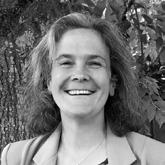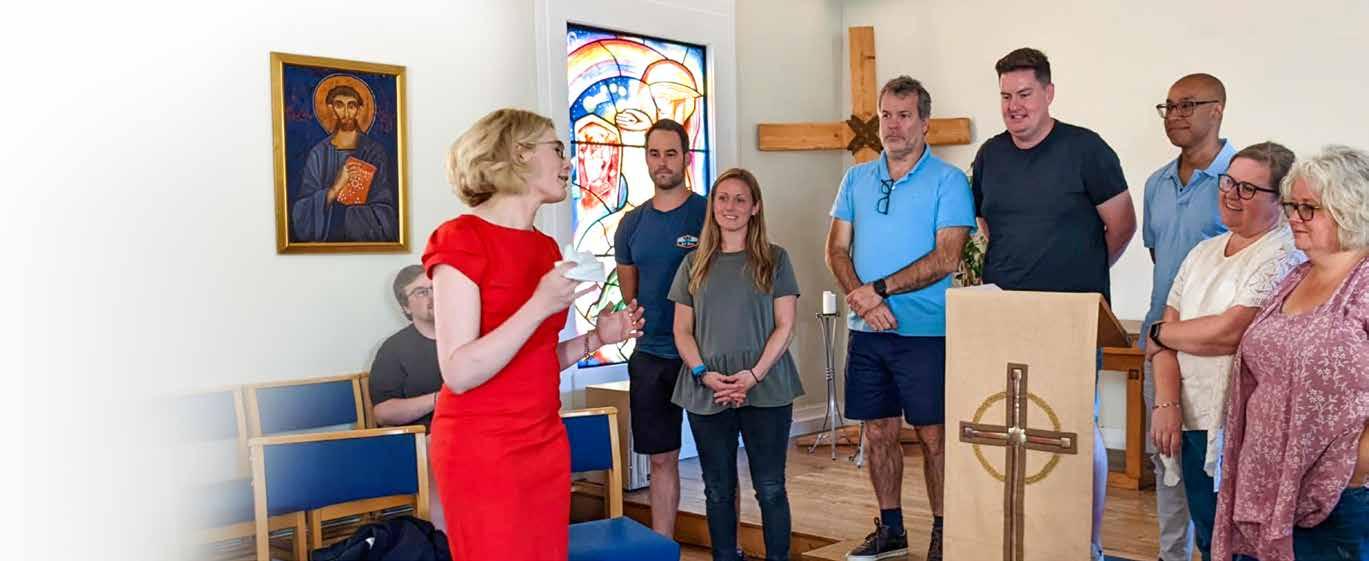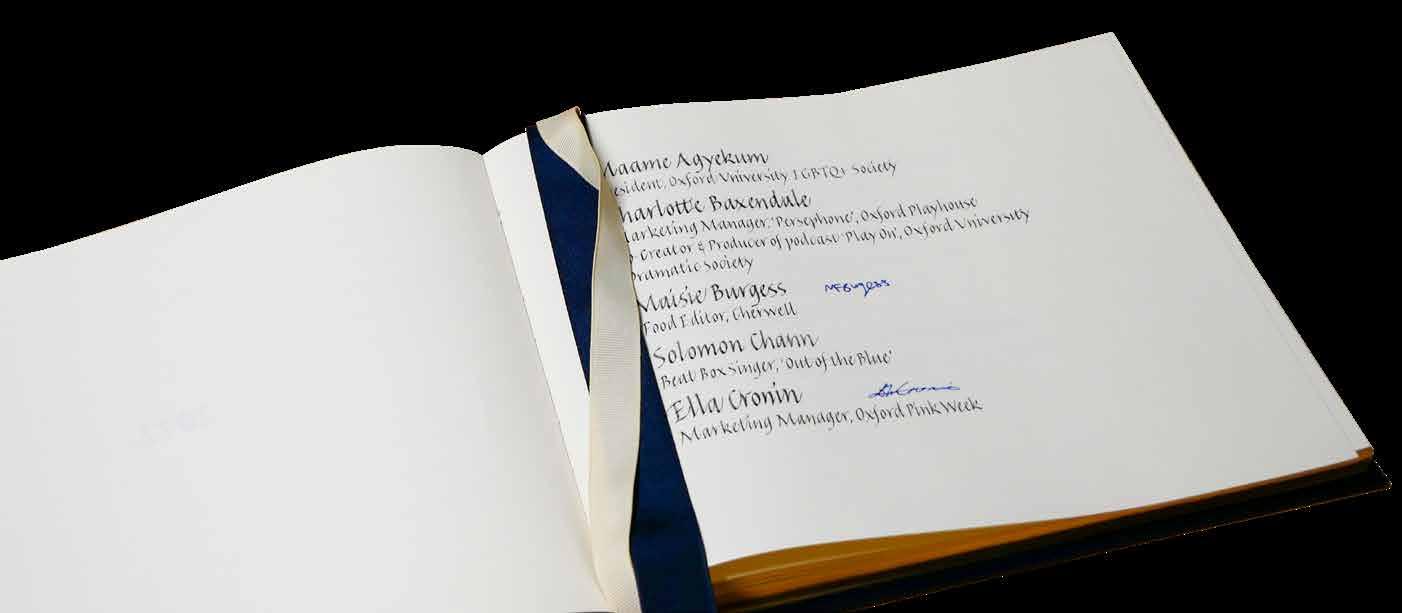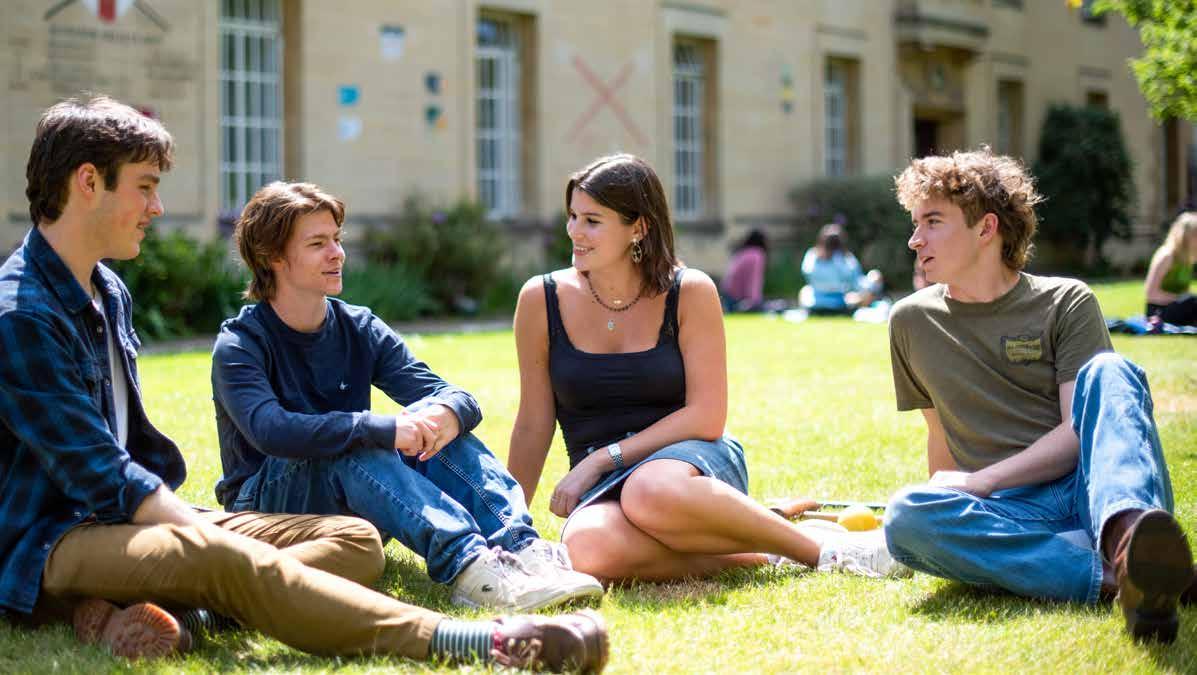REGENT’S NOW
Sir Malcolm Evans

















2022 saw women in leadership at all levels at Regent’s: in the JCR President, MCR President, ministerial students’ representative and the Interim Principal. We were delighted that two Regent’s women represented the University in the two best known sports events, the annual blue on blue clash of Oxford and Cambridge i.e., in the Varsity Match at Twickenham (Josie Osborne) and in the Boat Race on the Thames (Gabrielle Smith), both on the first weekend of April. That weekend also saw our first Gaudy for several years, and the Helwys Hall was filled with people, happily catching up on career and family news and hearing about the latest at Regent’s.
The periodic Baptist Colleges Peer Review of ministerial formation was carried out at the College in the spring, where a group of senior ministers from other institutions spent two days observing and interviewing ministerial students, staff, and support staff. The closing statement of the report stated that they were ‘impressed by the very high quality of the ministerial programme at Regent’s Park College and recognise teaching, learning and formation which can be trusted by both ministerial students and the wider Baptist family. Furthermore, we have recognised the clear contribution of Baptist identity within the broader scope of the college community and university life and trust the new chapter for the college’s ministerial formation programme will grow from strength to strength’.
The annual Recognition Dinner finally returned to its intended form in May. Those nominated for recognition, by the JCR and MCR, included students who had been capped for various University teams, people who had directed and produced plays, participated in opera, written for the student press, or held office in various University societies and clubs. The reach of students at Regent’s within the wider University is both wide and impressive. Our alumna, Hazel Barkworth, was the guest of honour and spoke entertainingly and movingly about her time at Regent’s.
During the early summer, the Regent’s community was heartened and excited at the announcement of the appointment of Sir Malcolm Evans as the Principal-Elect and started to look to the future and his starting in January 2023.


Early in Trinity Term, the news broke that St Benet’s Hall was closing, although there had been some indication earlier in the year that this may happen. The University approached Regent’s, amongst others, to discuss the possibility of some of the students from St Benet’s migrating to Regent’s and so, at the start of Michaelmas Term, we welcomed 28 new members of Regent’s, as well as our usual cohort of Freshers. The JCR organised very successful tailored welcome
events for each group. We have been acutely aware of the uncertainty and disruption that this caused the St Benet’s students concerned and are doing our utmost to enfold them into our community.
We have also welcomed several new members of staff including Dr Pieter Francois, lecturer in Human Sciences, Reverend Dr Andrew Adams, lecturer in theology, Reverend Dr Andy Goodliff, leading the online course in Baptist History, Reverend Dr Tim Judson, Lecturer in ministerial formation, Dr Timothy Smith, and Dr Sara de Martin, both lecturers in classics, Mihnea Cuibus, lecturer in politics, Gwen Dupré, Junior Dean, Douglas Idiahi, Night Porter, Declan Foster, Music Scholar, Neria Guterres Andrade, Housekeeping Assistant, Harvey Langley, Development Office, Sally Jones, Academic Administrator and Katharine Wiggell, Access & Outreach Officer.
At a unique Regent’s occasion, in October, we marked the death of Emmanuelle with a reflection on her life, followed by the burial of her ashes in the quad, in the very spot that Manny had favoured most for her daily cucumber and lettuce feast. Her memory lives on in the stained-glass window in the Chapel and in the minds of many alumni. A new resident tortoise will move in, after this hibernation season, and training for the Tortoise Challenge 2023 will begin in earnest.
Regent’s Park was very proud to offer post-lecture hospitality after this year’s annual Sam Sharpe Lecture. This, the tenth anniversary lecture and held in Oxford, was organised by the Baptist Union of Great Britain’s Sam Sharpe Project and formed part of the University’s Black History month series. The lecturer was Professor Kehinde Andrews, who challenged his audience and provoked post-lecture discussions that went on well into the following weeks.
My stay as Interim Principal has lasted longer than anyone had planned but has given me another opportunity to serve Regent’s Park and to realise afresh what a special place it is, even in a city of special places, and how lucky I have been to be associated with the College for this period.
Rosie Walsh, JCR President in 2021, won the Student Union’s College Community Award for exceptional hard work reviving the friendly atmosphere and sense of community that Regent’s is known for after two difficult periods when the College had to close due to Covid.

Ministerial student Amanda Higgin won Theology Slam 2022 for her talk on ‘recovery’. Theology Slam showcases the most engaging young voices on theology and the contemporary world. The competition is judged by some of the top theologians and communicators in the Christian world.

Dr Lynn Robson, Fellow in English Literature, was recognised by the President of Georgetown College, Kentucky for her fifteen years of service as the Director of the Visiting Students Programme. Regent’s continues to be enriched by its relationships with all its partner universities and by the visiting students who become part of the College community each year.

As Michaelmas term 2022 drew to a close, we thanked Elizabeth Crawford for her exceptional service and commitment to the College as Interim Principal for the last four terms.
Eliott Thompson (History, 2019) was awarded a Gibbs Prize in recognition of an outstanding performance in History, having received the best finals results in History of a student from an access background.

Lecturer in Politics Mathis Ebbinghaus won an Early Career Award in the Social Sciences Division Teaching Excellence Awards, which recognises an exceptional contribution to education by colleagues at any career stage.
Regent’s is a partner in the Sam Sharpe project, so we were thrilled to host the 10th Sam Sharpe Lecture here at the University of Oxford in October with speaker Professor Kehinde Andrews.
Josie Osborne (Geography, 2019) played for Oxford University in the Women’s Rugby Varsity match at Twickenham, and Gabrielle Smith (Water Science, Policy and Management, 2021) rowed for Oxford in the Blue Boat at the Oxford/Cambridge Boat Race.
It was a privilege to host Alban Kurti, Prime Minister of the Republic of Kosovo, during his visit in June to speak at the Oxford Union. Prime Minister Kurti came to prominence in 1997 as the Vice-President of the University of Pristina Student Union and organiser of non-violent demonstrations in the late 90s. His role as Prime Minister is perceived as an essential factor of stability in the Western Balkans. With thanks to MCR member Israr Khan, who is studying for a DPhil in Socio-Legal Studies and is a committee member of the Oxford Union.
Three beautiful new stainedglass windows were unveiled in Regent’s Chapel in April. The windows were originally commissioned by Revd Dr Myra Blyth during her time as Chaplain. We are indebted to Nicholas Mynheer for his beautiful designs and to glass painter Stephen Cowan who brought the artwork to life.
Chapel highlights included a guest appearance of Oxford’s internationally acclaimed acapella group, Out of the Blue (in which Regent’s is well represented!), to help lead worship with a difference.

If you connected with Regent’s this year by volunteering your time, offering some expertise, making a donation or simply encouraging current students with your career news, then you are at the heart of what we have been able to achieve in the last twelve months. A growing number of alumni and friends are involved in the College in these ways and others. Thank you.
A group of students spoke to many alumni in June over the phone to help strengthen the connection between students past and present, hear what studying at Regent’s is like today and raise funds for the Student Support Fund and other essential needs.

This was the first time we had reached out to alumni by phone since 2014, so thanks to all of you who had a conversation with a student. Katie, Pip, Katerina, Jack, Courtney, Charlotte and Roisin enjoyed hearing about your experiences at Regent’s and Greyfriars, however recent or long ago, and what you have done since! We hope you found hearing what College life is like for students today informative. We very much appreciate the support that so many of you pledged to help us improve what we provide for students. All gifts of whatever size make a big impact in our small community.
‘As today’s students and alumni are more than aware, Regent’s tiny size makes it unique among the Oxford colleges. It makes our experience here intimate, friendly and inherently welcoming but it also means we often struggle for funds to support all the important activities, resources and support that keep us going socially, academically and mentally. For this reason, as well as the chance to engage and share experiences with alumni, I was excited to be part of the Telethon in June. My hope is that bonds can be strengthened between past and present students, and help ensure Regent’s is as special in the future as it is now!’
Katie (third year Geography student)‘I really enjoyed being part of this year’s Telethon. It was such an invaluable opportunity to get advice from people who’d been in my shoes a few years before me, just at that stage in my life when I was leaving university. Many people were happy to support me by sharing their experiences, and that’s been so useful.
It was also so lovely to hear about the longer tradition of Regent’s students who’d come before me and learn about what the College looked like for them.
Thank you so much if I spoke to you on the phone. I really valued your time and appreciated hearing from each and every one of you. It was also really good to be able to give back that little bit that I could to Regent’s after a really fantastic three years. Thank you, Regent’s, for helping us to safeguard the College’s future’.
Roisin Nolan (2022 leaver)In total thanks to the Telethon £57,000 was pledged. It was especially important that many of you chose to give regularlyknowing that we can expect your support helps us to plan what we can offer students. The Telethon was a demonstration of our wider community’s commitment and warmth towards everything we aim to do at Regent’s – and that is incredibly encouraging!
Students from the 2022 Telethon calling teamA generous donation has meant that for the first time at Regent’s, expenses for undergraduate Geography dissertation research, which often involves unavoidable costs, can be funded. Third year Isla explains why the funding was so important for her research amongst care workers:


‘My dissertation looks at how agency care workers build dignity when faced with pervasive stigma, poor conditions, and precarity. In a series of interviews, I explored how they use subtle tactics to resist these oppressive discourses and practises. I worked in care during the COVID-19 pandemic, and after experiencing how stretched these workers are, I strongly felt it was an ethical imperative to pay interviewees. I wanted to compensate them for their time, their energy, and their willingness to be vulnerable. This follows feminist directions in Human Geography methods which address the power dynamic between academics and the people or communities we research. I was really grateful that College was able to help me out by funding my work!’
As a result of a generous gift which has been matched by the Faculty of Law, we have provided a scholarship to a student on the world-renowned Bachelor of Civil Law course.

The scholarship recipient Steven Clowes (pictured) writes, ‘The Regent’s Park College and Faculty of Law Scholarship has afforded me an opportunity to study at one of the best universities in the world and be part of a unique and vibrant community. Regent’s Park College has an intimate and diverse graduate student body ranging from mature ministerial students to young humanities students. This diversity of experiences makes for interesting conversations in and around the College, especially in the Middle Common Room (where I serve as the Treasurer). Coming from a corporate law and economics background in South Africa, this
diversity has been enriching and expanded my world view. The Bachelor of Civil Law (BCL), although demanding, has been thoroughly enjoyable. Thus far, the BCL has shown me that appropriately crafted laws and policies can bring about lasting social change and it has cemented my desire to help address developmental challenges in South Africa, particularly poverty, unemployment, and spatial and wealth inequality. Following the BCL, through legal work and involvement in the rural and agricultural economy, I hope to help change South Africa for the better.
I am incredibly grateful to Regent’s Park College and the Faculty of Law for this scholarship and opportunity’.

A thoughtful donation from Nicholas Adams (Jurisprudence, 2004, Greyfriars) and Jo Jimenez (History and English, 2005, Greyfriars) has enabled us to give a major facelift to the outdoor area between the Angus and Gould buildings, creating an additional space for students to use, practical bike storage and a muchimproved view from the surrounding bedrooms. In recognition of the generosity of this gift and the donors' vision for the potential of the space, we are delighted that this new area will be named the Jimenez Quad.
With sadness we announce the loss of long-time friend of Regent’s Park College, Dr William H. Brackney.
Dr Brackney’s association with Regent’s began in 1982 when he visited with his wife, Kitty, receiving a warm welcome from Professor Paul Fiddes, who introduced them to the treasures in the College’s Angus Library and Archive. Several visits and a sabbatical stay followed, and Dr Brackney later became a Research Associate of the Centre for Baptist Studies.
In recognition of the support and friendship received from academics at Regent’s, in particular Professor Paul Fiddes and Dr Larry Kreitzer, in 2019 the Brackneys made a generous donation to the College to establish and endow the William H. and Kathryn E. Brackney Angus Travel Bursary.
The facilities of the Angus Library and Archive are of huge benefit to scholars of Baptist and Nonconformist history and also to

those pursuing wider academic interests, particularly but not exclusively in the areas of theology and history. This new travel bursary enables younger scholars from North America to access the resources and facilities in the Angus in person, opening up huge potential for their research and facilitating connections between scholars with shared academic interests in Oxford and abroad. It is thanks to Dr Brackney’s vision and kindness that the Bursary is thriving and is now in its third year. So far, two scholars have travelled over to take up the opportunities the Bursary provides:
Landon Adams, senior resident PhD student at the New Orleans Baptist Theological Seminary and Baptist Student Union Director at William Carey University, used the Bursary to research the early life of missionary William Ward:



‘I had two main goals in visiting the Angus for research regarding William Ward. First, I am researching the earliest BMS connections of William Ward and their impressions of him. I was able to find several letters mentioning Ward, providing clarity for my interpretation of Ward’s place in Fuller’s and Carey’s correspondence 1796-1798. Second, I am researching for a chapter on the Serampore Form of Agreement Commentary. This requires extensive use of Ward’s journal 1799-1805. Seeing the original journal, and being able to confirm its contents has been helpful.
I am appreciative of the Brackney Travel Bursary, Emily Burgoyne’s archival assistance, and the rest of the Regent’s Park faculty in making this research possible’.
Independent scholar Ray Rhodes visited the Angus in September 2022 to pursue his research on Charles Spurgeon for a forthcoming book: The William H. and Kathryn E. Brackney Angus Travel Bursary significantly aided me in being able to visit Oxford for the purpose of my research for my upcoming project on Spurgeon, and have access to the vast array of resources related to Charles Haddon Spurgeon housed at the Angus Library. Librarians Emily Burgoyne and Rebecca Shuttleworth tirelessly planned for months in advance, with Dr Chris Joynes, to make sure that every opportunity was afforded to me. Their level of professionalism and thoughtfulness is a credit to Regent’s Park College and to the robust academic community contained therein.



On Saturday 2 April it was a joy to open the College’s doors and welcome alumni from across the year groups to a dinner in College. Drinks were held in the Principal’s Lodgings, and we were extremely fortunate to have award-winning author and broadcaster Nicholas Crane as our after-dinner speaker. Nick’s books include The Making of the British Landscape, Why Geography Matters and Latitude and on TV he is best known as the presenter of the BAFTA winning BBC series Coast. In 2021 he was elected a Fellow of the Royal Historical Society. Nick spoke to us about his travels including a one-and-half-year solitary hike across Europe (including Ukraine) to mark the end of the Iron Curtain, and travelling into the Hindu Kush with the mujaheddin during the Soviet invasion of Afghanistan. Guests then adjourned to the JCR where Chris Holmwood (English Language and Literature, 1987) and Anthony Clarke (Theology, 1988) kindly served behind the bar with great skill! We look forward to the next occasion.






At the start of Trinity term a muchanticipated triptych of stained-glass windows were unveiled in Regent’s Chapel, overlooking Pusey Street.
The windows have been designed on themes of Creation, Ministry and Revelation by local painter and sculptor Nicholas Mynheer and were produced by stained glass painter Stephen Cowan. We were delighted to welcome back past Chaplain Revd Dr Myra Blyth, who commissioned the windows, to preach at a special service at which she and the artist thoughtfully brought the themes in
the artwork to life. You can read about these on our website, and the observant will notice a reference to the pandemic during which the glass was painted, and to the College tortoise.
The design and creation of the new windows was entirely enabled by generous donors who were committed to seeing this project come to fruition. We are enormously grateful for their support.

You are most welcome to visit the College and view the windows, please let us know at development@regents.ox.ac.uk so we can welcome you.
More alumni than ever before gathered for our annual London Drinks event in early July! We are grateful to David Lonsdale (Jurisprudence, 1983) for generously hosting the event in the ballroom at The Sekforde in Clerkenwell. Invitations to alumni events are usually sent by email. If you are not receiving invitations please contact development@regents.ox.ac.uk so we can ensure you don’t miss out.
We were bowled over by the support that alumni and friends showed to the College during our first Giving Day in May 2021. It was amazing to see what we could accomplish together. The £55,000 raised was truly significant for Regent’s and led to an additional £100,000 gift from a generous donor.
So it is with great pleasure that we announce that this success will be followed with our second Giving Day on 23 and 24 May 2023.
Our Giving Day is a time-limited fundraising event that will join members of the entire Regent’s community together online. Funds raised will go towards making the experience of studying here the best it can possibly be and we hope to achieve even more towards this goal with our second Giving Day.
During this 36-hour event, we’ll be encouraging alumni, staff, students and supporters to celebrate and support the things that make our College and its students exceptional. The involvement of our community will be essential to the success of Giving Day and we hope that you will join us we get ready to take on this exciting challenge. You’ll hear much more as the date gets closer, but everyone can play their part in this community celebration by giving, sharing memories, spreading the word and helping us achieve challenges on the day.
If you would like to boost what we can achieve and inspire others to give, there are two special ways to deepen your involvement and impact before the 36 hours begin:
• Be part of the story the Giving Day will be telling, by letting us know what Regent’s means for you, and how being at the College has influenced your life.
• Double the impact of donations by offering matched funding, or challenge the community with a gift if fundraising milestones are reached on the day. Contact viola.kerr@ regents.ox.ac.uk if these opportunities to support your College interest you! However you’d like to be involved, the part you play will make a difference.
The Finance Committee is a subcommittee of Governing Body with delegated responsibility for finance and investments. Anthony Harris (English Language and Literature, 2007) has served as Honorary Treasurer since 2014. He reports:
‘Prior to 2015 it would have been an understatement to say that the College finances were not in a strong position. The endowment stood at only just over one million pounds and each year saw a pattern of an increasing deficit and decreasing endowment. Fast forward to financial year 2018/19 and things could not have been more different. The endowment stood at over four million and the College reported a surplus of just under £350,000. Sadly, the pandemic took college conferencing revenues to zero for 2020 and 2021 but the cash position remained strong. Maintaining a cash surplus means that the College has not needed to dip into its investments since 2015 and this has allowed its endowments to grow. As of autumn 2022, the college endowments stand at some £8m and income streams are once again starting to build momentum as the pandemic subsides. Whether the College can reach a stretch target of a £10m endowment by 2025 (set by the Treasurer) remains to be seen but it is true to say that the College is now in the strongest financial position that it has ever been. Given the financial history of the College this is a message that some find somewhat surprising. Thankfully, this is one surprise that we can all be happy with and certainly very proud of. What this enhanced financial stability means is that any financial gifts that the College receives can be directed to strategic projects rather than backfilling a deficit. Given this information we hope that you will consider making a financial gift to the College knowing that it will be well managed, well used, and very much appreciated!’
The new windows will enhance the experience of worship, teaching and discussion in the Chapel space for many years to come.
The current committee consists of the Principal, Director of Finance, Director of Operations, Director of Development, Tutor for Graduates, Chair of Governing body and six further members, all alumni:


After a successful career as a technologist and entrepreneur, I studied English at the Oxford Department of Continuing Education and in 2007 was accepted to Regent’s Park to read for an MA in English Language and Literature. I went on to study for an MA (Res) in Medieval Studies at the University of Reading and a PhD at the University of Cambridge. As well as my charity trustee work for Regent’s I am also an angel investor with an extensive investment portfolio, and a non-executive director on the board of various start-up companies and not for profit organisations. I am a Research Fellow and Tutor of Clare Hall, Cambridge. Academically, my research interests cover Old English Language and Literature, Anglo-Latin Literature, the science of computus (the calculation of the date of Easter), and the use of sciences to assist the interpretation of early texts.

I am a programme and project manager with over 20 years’ experience of delivering business change and improvement, especially with a digital focus, working for Procter & Gamble, Historic England and now at the Cabinet Office.


I served on Council/Governing Body as JCR President and subsequently as leavers’ representative before being elected as a full member in 2000. Since then I have been keen to continue to give something back to the College by supporting the strategic work and governance and have supported various individual projects and committees, including the Risk Assessment Committee and as a member of the HLF grant project board. My recent focus has been as a member of the Vision 2020 Group and in particular looking to develop our buildings estate where I am acting chair of the Banbury Road development project board.
After qualifying as an accountant in public practice I pursued a management career in the NHS and charity sector. I then trained for Baptist Ministry at Regent’s and served Littlemore Baptist Church in Oxford until I (supposedly) retired. Since then I have found a bit more time to indulge my lifelong passion for sailing and to be with friends, grandchildren and other family. I have also continued working with several churches, a food bank and some ministers. My academic and research interests include organisations and systems failures, particularly from a relational perspective, and ethical concerns in the post digital context and from the environmental crisis.
Since my time at Regent’s, I have worked for the UK government in a variety of economics & finance roles. Currently I am part of the UK’s mission at the International Monetary Fund, having last worked for the Foreign Office in Mumbai, and before that for the Treasury in a variety of Whitehall jobs. I am also Deputy Treasurer of the Camden Citizens Advice Bureau. I look back at my undergraduate studies with great fondness, and want to use the skills developed through my working life and other volunteering roles to help the college flourish further. COVID challenges aside, Regent’s has strengthened its offer to students each year since my studies began, making it a very exciting organisation of which to be a part.
I am a solicitor advocate specialising in dispute resolution in the City of London. I act for large corporations from all around the world, and I help them solve their most complex disputes where significant sums of money are at stake. As a former student of Greyfriars, I experienced first-hand the difficulties that arise when an Oxford college does not organise itself on a long-term and sustainable basis. It has been a real pleasure serving on the finance committee to help Regent’s to secure its own financial future.
I have seven years’ professional experience of managing endowment portfolios, initially at OUem (a £5.5bn charitable endowment fund) and latterly at Talisman Global in London, where I work in a generalist role across global equity, hedge funds, private equity, and private credit. I proposed the establishment of a dedicated Investment Committee for the college in 2019, believing that Regent’s needed a separate institutional framework to oversee its endowment assets and ensure they were being stewarded and spent appropriately. Since the establishment of the committee, I have helped the college in rationalising the number of investment managers it uses; developed our ESG initiatives; and worked to track performance of the endowment assets in a more granular manner, amongst other aspects.


Few things seem to surprise me more than what comes next. I do not really ever recall when, or why, I decided to study Law at university. It just happened. Indeed, I may not have been the one who made the decision at all. Certainly, my school was not too keen on it: I was advised not to apply to university at all, as it would probably ‘end in disappointment.’ Most of my friends followed the similar advice that they were given. But there is nothing like being told you cannot do something to make you want to do it – so I did apply and, to rub it in, I applied to Oxford. Through life’s alchemy, I found myself at Regent’s in the autumn of 1979, starting a degree in Jurisprudence. This did not go well, or so I thought. Whilst I was ‘getting by’, I did not think Law was for me but, having started, I finished. And I shall never forget the words spoken to me by my tutor, at University College, when hearing that I had achieved a First, which were ‘I take it you have heard about this shock to my system.’
His shock was nothing to mine. I had decided not to pursue a career in law at all and started working for a Bank in the City of London, which I duly did – along with three other trainees, one from Keble and two from St Benet’s. A year later, knowing that banking was not for me either, I found myself back at Regent’s, commencing a DPhil, focusing on International Law, largely as it was the only area of law that had really interested me. And it still does. My thesis concerned the delimitation of maritime boundaries. I will not expect readers to be as excited about the topic as I was then and still am now – though I am more than happy to hold forth on the subject at length if asked. It seemed my study of Law at Regent’s had gone slightly better than I first had thought.
College life at Regent’s had gone well from the start, however. Never having been interested in anything remotely sporting before, I found myself drafted into
rowing. By the time I finished my DPhil, I had amassed three blades (two Torpids, one Eights), been Captain of Boats for two years, sunk one boat and raised the money to buy another, and put out the first ever Regent’s women’s crew on the river (in a year when the men also had a Regent’s I and II for the first time). I was also JCR Treasurer and later JCR President too. Of the latter, there is still proof on the board in the JCR. Another thing that went well was meeting Alison whilst she was training for the Baptist ministry at Regent’s. A Baptist myself, we were married at New Road Baptist Church, where we lived above REGENT’S NOW COLLEGE LIFE
the coffee shop until we left for Cardiff and Alison’s first church. Not that we planned to go to Cardiff: indeed, it was the one place we thought we did not want to go to. Alison had already studied for her undergraduate degree and PhD there, and it was where I was from. Importantly, Cardiff is not all that far from Bristol, where I was offered a position as a lecturer in the Law School in 1988 and where I remained for 34 years, though some might question that assertion.
During my time at Bristol, I became Head of the Law School and then Dean of the Faculty of Social Sciences and Law, the largest in the University. I also found myself moving into other branches of international law and in particular international human rights law. Like most things, this was somewhat accidental and largely the result of being asked to establish a course teaching it. I came to focus on two areas, the international protection of the freedom of religion or belief and the prevention of torture. (I was once introduced to an audience as specialising in ‘torture preventing religious freedom’ – a rather unfortunate as well as inaccurate conflation). For ten years I worked as an independent expert with the Organisation on Security and Co-operation in Europe looking at laws relating to the organisation and regulation of religion in Eastern Europe and Central Asia, as well as with other national and international organisations. I also became heavily involved in a number of initiatives concerning the teaching of religion or belief in schools.
...the ‘real world’ needs all the wisdom that can be derived from the learning that universities generate.
Evans explains the path that has led from studying at Regent’s to becoming Principal.
NGO work and, in 2009, I was nominated for election to a United Nations group of experts, oddly called the ‘Subcommittee on Prevention of Torture’ (odd, because it was not a subcommittee of anything - but that’s the UN for you!) and of which I became Chair for ten years, until the end of 2020. Its job was to visit places of detention in various countries around the world, without giving notice, to speak with detainees and examine their treatment, and to try to ensure they were not at risk of torture or illtreatment. We produced reports and made recommendations for improvement, which we worked with governments to implement. Much of the work was (and is still) confidential but it is true to say I have seen the inside of at least some of the worst places that it is possible to imagine, and some of the worst things that people can do to each other. It is fair to say that I never imagined I should ever be doing such things.
Nor did I ever imagine that, because of my background in seeking to prevent abuse in closed institutions, I should be asked to become one of the four Panel Members of the public inquiry concerning institutional responses to child sexual abuse in England and Wales, then the largest and most wide-ranging public inquiry ever undertaken. This has recently concluded, having produced over 20 separate investigation reports over nearly seven years, involved of 2.5 million pages of evidence, having heard from thousands of victims of child sexual abuse and examining how this has been responded to by local authorities, the police, schools, religious organisations, youth custodial institutions, as well as issues concerning child sexual exploitation, the internet, accountability and reparations, and much else besides. Many of our recommendations have already been implemented and I will be watching long and hard to see what happens to those set out in our final report.
Throughout all this, I have continued my academic work, since it is inseparable from all else that I have done. I have never believed that universities are not a part of the ‘real world’, and a fervently believe that the ‘real world’ needs all the wisdom that can be derived from the learning that universities generate. Everything in my career has started with the university and has been taken back to the university. And taking that one stage further, everything I have done has started with Regent’s – and has now brought me back to Regent’s. Not that I have been entirely absent since I

graduated: I have been on College Council and Governing Body for many years and was Chair of Governing Body too. So in some ways, I have never really left the College; but then, few of us ever do. We carry it with us into whatever comes next, whatever that is. The real surprise is that the next thing for me is to return as Principal - another thing that I did not see coming until it arrived.
I am not going to begin to predict what surprises this new future will bring
for me, for the College, and for the College community. Doubtless, there will be some surprises – there always are. What I am sure of is that surprises bring opportunities, and I am excited at the prospect of the opportunities that lie ahead. The College has changed and developed greatly in many ways over the years in which I have known it, which is as it should be. Helping take the College into the next phase of its story will be yet another privilege I could never have imagined.
Helping take the College into the next phase of its story will be yet another privilege...

The Centre has had a busy year of events in 2022. Project Violet, a three-year participatory research project into the place of women in Baptist ministry hosted by the Centre and led by Helen Cameron and Jane Day, continues to attract significant attention. The first two phases of the research have been successfully completed and women co-researchers are now working on their projects with the support of the project coleaders. Online seminars have kept supporters connected to the research. Rachel Muers and Ruth Moriarty addressed the theme of ‘Discernment, dialogue and the Church Meeting’ whilst Lina Toth and Beth AllisonGlenny discussed ‘A Theology of the Family’.
The Centre co-sponsored with the Baptist Historical Society a triennial summer conference in July 2022 at Woodbrooke, Birmingham on the theme of British Baptists in Nineteenth-Century Culture. Papers ranged from analysing Baptists and the Bible in Nineteenth-Century Culture (Chris Joynes) to exploring relations between the Baptist Missionary Society and Bible women in Haiti (Bianca Dang).
We held a groundbreaking day conference ‘Charting the History of Black British Baptists’ at Regent’s in November. Speakers discussed Black Baptists in a white imperial world (David

Killingray) and the liberatory writings of Rev Peter Thomas Stanford (Barbara McCaskill and Sidonia Serafini). Gale Richards highlighted the significance of retrieving the voices of Black Baptist women whilst Eleasah Louis raised methodological issues around ‘marching through Black-British Baptist minefields’! The Centre also continues its strong partnership with the Sam Sharpe project, sponsored in its tenth anniversary year in 2022 by the University of Oxford with Kehinde Andrews as the guest speaker.
Our CBS Lunchtime Seminars continued in 2022. In the spring, we welcomed the creators of Creating Sanctuary (Myra Blyth, Luke Dowding, Andrea King) to share their research. The Trinity term seminar welcomed Rev Dr Martin Hobgen who presented on the theme of Disability and Friendship.
We embarked on new collaborations during the year, working together with the Centre for Anabaptist Studies at Bristol Baptist College and the Anabaptist Theology Forum to co-organise the online event Exploring Anabaptist Theology. CBS Research Associate Malcolm Yarnell led the discussion.
The Centre has continued to publish a variety of literature, ranging from Andy Goodliff’s 2022 Whitley Lecture (The Ruling Christ and the Witnessing Church: Towards a Baptist Political Theology) to Murdina McDonald’s London Calvinistic Baptists 1689-1727 and Matthew Stanton’s Liturgy and Identity.

Details of our forthcoming activities can be found via the College website, or our Twitter account @CBS Oxford. We continue to work in close collaboration with the Angus Library, for example supporting the ‘Opening the Angus’ online seminars and the appointment of the Brackney scholarship. Many of our events will continue online or hybrid in 2023, so we hope that you will join us!
From the history of Romanian Baptists in the first years of the 20th century, to research into women missionaries in the Congo, so much interesting research takes place in the Angus reading room that we often travel through many centuries and countries in one afternoon!
The first volumes of the Baptist Missionary Society subcommittee minute books have undergone conservation and repair work and this project will continue until all of the volumes have been stabilised. Thanks to the generosity of the Friends of the Angus, the diaries of Jane Attwater, which give a glimpse into the spiritual life of a Baptist woman in the 18th and 19th centuries, have now been photographed and placed on an open collections platform. The platform also hosts other fascinating materials from the Angus, such as the Hexham and Hamsterley and Cripplegate church books, and Stinton’s Repository (1712).
The Angus participated this year in the ‘Finding Archives and Manuscripts Across Oxford’s Unique Special Collections’ project, which aims to improve access to manuscripts held throughout the University. Interesting manuscripts in the Angus include an early 19th century Bengali Grammar, beautifully written by William Carey.
We were pleased to produce an overview film of Sam Sharpe’s life and the events of the rebellion, using the important collection of material regarding Sam Sharpe and abolitionism held in the Angus.
The Friends of the Angus continues to flourish and this year we have held ‘Opening the Angus’ talks on topics reflecting the rich variety of the collection, including ‘William Carey as a botanist’, ‘Amnesty International and the Human Rights movement’, ‘Margaret Jarman, Deaconess and seminal figure in 20th century Baptist life’, ‘the use of Magic Lanterns in mission by British Baptists’ and ‘Edith Gates, a pioneering woman in Baptist ministry’.
CHRISTINE JOYNES, DIRECTOR OF THE CENTRE FOR BAPTIST STUDIES & TUTORIAL FELLOW IN THEOLOGY

The Oxford Centre for Religion and Culture was fortunate this year to launch two books commissioned by the Dialogue Society, a partner of the Centre: Fethullah Gülen’s Teaching and Practice: Inheritance, Context and Interactive Development and Paul Weller’s Hizmet in Transitions: European Developments of a Turkish Muslim-Inspired Movement. These books were launched at a symposium at Regent’s.
The centre hosted a four-part seminar series on the theme of ‘Religious Dialogue.’ Dr Sariya Cheruvallil-Contractor presented ‘Muslims on Dialogue’, Jeremy Rodell on ‘Humanists and Dialogue’, Professor Michael Taylor on ‘Christians and Dialogue’, and Rabbi Jackie Tabick on ‘Jews and Dialogue.’ The series then concluded with a group discussion between each of the series’ speakers.
In the Michaelmas Term the Centre and the College came together to launch my latest book, entitled Introducing James H. Cone. It explores the singular importance of James H. Cone to the development of Black Theology as an intellectual movement and discipline. It outlines the historic significance of Cone as arguably the greatest theologian of the twentieth century, and offers a thematic and historical assessment of Cone’s legacy, from his first book Black Theology and Black Power in 1969 through to his final intellectual autobiography Said I wasn’t Gonna Tell Nobody in 2018. In nearly 50 years of published work, James Cone redefined the intent of academic theology and defined a whole new movement in intellectual thought. The launch was attended by around 50 people, kicking off the new academic year.
The OCRC was also pleased to run another seminar series, exploring ‘Peacemaking and Peacebuilding.’ This was
run in conjunction with the Bruderhof society. Bruderhof are a radical Anabaptist movement who have created a number of intentional Christian communities in which all capital, financial and human resources are shared in a spirit of radical solidarity and equality. Our speakers included academics and practitioners, some reflecting on the practical challenges of undertaking peacebuilding work, while others were concerned with scholarly reflections on some of the theoretical dynamics of peace making. The series was inspired and informed by Russia’s invasion of the Ukraine.
Throughout the last year, OPGDI has continued its programme of collaborative engagement on the most pressing issues facing the human population in this era of globalisation, drawing insights from leading scholars and experts from a diverse range of disciplines and specialisms.
In Hilary Term, the institute delivered a six-part online lecture series on the theme of ‘Technology, Society, and Humanities in times of transformational change.’ Prof. Kersti Börjars (Master of St Catherine’s College) delivered a lecture titled ‘Languages Don’t Change, People Change Languages’, Prof. Jonathan Wolff (Blavatnik School of Government) considered ‘The Future of Work’, Prof. Sam Fankhauser (Oxford Smith School) addressed ‘Climate Change and Net Zero Emissions’, Prof. Nir Vulkan (Said Business School) examined ‘The Way Ahead for AI in Banking and Finance’, Sir Walter Bodmer (Head of
Cancer Laboratory) spoke on ‘Genetic Characterisation of Human Populations and Health Implications’, and Sir Mike Brady (Department of Oncology) asked ‘Is this the Age of Intelligent Machines?’
We were joined in Trinity Term by Prof. Carlos Rojas (Asian and Middle Eastern Studies at Duke University) for a lecture titled “Words Bridge Cross Borders.” And in a very welcome return to in-person presentation, Prof. Robert Walker (Department of Social Policy and Intervention Oxford and Beijing Normal University) presented ‘Poverty and New World Order’.
2022 also saw a continuation of OPGDI’s Oxford Restorative Justice seminar programme, with participants engaging in intensive and ongoing peer collaboration on the many aspects of this topical issue. The seminars examined the philosophical roots and social relevance of restorative justice and restorative justice in the contexts of gendered violence, policing, and the criminal justice system.
The new academic year began with OPGDI’s Globalisation Series, opening with a conversation between Prof. Sir Malcolm Evans and Prof. Ian Goldin on Prof. Goldin’s new book: ‘Rescue: from global crisis to a better world’. Other instalments included Prof. Colin Bradford (Brookings Institution) on expanding the G8 into the G20, and a conversation between Sir Tim Hitchens (President of Wolfson College) and Alice Nderito (Under-Secretary-General - UN Special Adviser on the Prevention of Genocide) on international diplomacy.
We were very pleased to hold the second year of the Oxford-BNU Creative Writing Award, which aims to encourage and celebrate cross-cultural dialogue and exchange. The competition’s opening was marked by an online panel conversation between the previous year’s three prize winners, sharing insights into their writing processes with Dr Lynn Robson. Alongside Lynn, this year’s judges include Boyd Tonkin, former Chair of the judging panel of the Man Booker International Prize, Liz Trubridge, Executive Producer of Downton Abbey, and Davis Bunn, novelist and Writer in Residence at Regent’s. We look forward to the announcement of the winners at the Award Ceremony in early 2023.
The Institute has also been pleased to organize a drinks reception for our crosscollegiate visiting students, marking the first of many social events throughout the academic year.
 Gabrielle Smith
Gabrielle Smith
Andrew Taylor (BA Philosophy and Theology, 1978) hears from two rowers about training and competing on the international stage: his daughter Hattie Taylor and Gabrielle Smith (MSc Water Science, Policy and Management, 2021). At the 2020 Tokyo Olympics, Hattie represented Great Britain in the coxless four and Gabrielle represented Canada in the double sculls. More recently, Gabrielle rowed in the Women’s Blue Boat for Oxford at the 2022 Oxford/Cambridge Boat Race. Andrew competed in bumps as a student at Regent’s and has since volunteered as a coach. Before coming to Regent’s and Oxford for her MSc, Gabrielle studied at McGill University in Canada. Hattie attended Syracuse University in the U.S.
Andrew: How did you get into rowing?
Gabrielle: I got into rowing through a summer job. I was working as a beach lifeguard on Toronto Island, and we had these big old-school rowboats. Every day we’d go to our station, grab our rowboat and equipment, and then row off to our beach for the day. I really liked it, it was a fun workout, fun to be on the water. This was during the summer of the 2012 London Olympics. My Mum had been watching it on TV and had seen someone from Rowing Canada who said, “If you know anyone who is young, tall and strong, then give us a shout.” Unbeknownst to me, she called them and set up a testing
date. I did the testing and was selected for the Row to Podium program, a talent selection program in Canada. I never actually rowed for McGill. I started through this program. It was a great experience overall, and pretty different from what I expect your experience was like at Syracuse, Hattie. I was almost exclusively in one very small team. It was just me and one or two other athletes working with our coach. It was a lot of one-on-one time, a lot of sculling, and a lot of time in the single.
Hattie: I started when I was in the first year of secondary school. Our school had just started a boat club a few years earlier. It was very small and they were looking for new
This is something I might be able to make into a career, I’ll give it a crack.
students. There was an Easter break taster camp. Dad [Andrew] had done a bit of rowing at university, and I was fairly tall as an eleven-year-old. I just thought, “I’ll give this a go and see what happens.” I basically just started then and didn’t really stop. I rowed pretty much my whole way through school until I was eighteen, took a gap year, and then went to Melbourne and rowed some more. I did some coaching out there, and during that time I got into Syracuse. At that point, I hadn’t done any junior worlds or European junior racing. I went to Syracuse and did my four years there and a couple of U-23 summers. In my fourth year, I thought, “This is something I might be able to make into a career, I’ll give it a crack.” Rio had just taken place and I thought, “Okay, three years until Tokyo, let’s just see what happens.” I went back and joined the senior team, raced and did trials. I did well and got selected for Tokyo in the four.
Andrew: What was Covid like for you both?
Gabrielle: For the most part, I think that it wasn’t too bad here in Canada. Our training centre here is on an island that is fairly reclusive, so it’s not like being in a large urban area with lots of restrictions. We were off the water, probably, from March until July. But, in the meantime, we’re surrounded by mountains and beautiful cycling roads. And Rowing Canada gave us all spin bikes and weight equipment, so, from a training perspective, it was fine - maybe even a little enjoyable to be out of the boat for a break and train outside. But it was a bit lonely, not having your teammates with you.
Hattie: I had the total opposite experience of that. We got sent home around the end of March 2020, probably the same as you Gabrielle, and then the country was fully locked-down. We were only allowed to leave the house for essential shopping and one period of exercise per day. For me, in terms of training, we had weights and equipment—we could get the training done— but I realised that I get through because I have my teammates and I’m at the training centre. You pick up the adrenaline, and, on days when you’re really tired, the person next to you is doing it as well and you know that you need to do it together. So, I think I struggled a bit with not having my teammates. And we weren’t on the water from March until September, so a good chunk of the year. We couldn’t go to the training centre. We couldn’t do much at all.
Andrew: How did it feel when you knew that you were going to Tokyo?
Gabrielle: Excited, but it took a while to sink in. Sometimes it feels like it still hasn’t sunk in, that I went there and did it, and that I’m an Olympian now. It still feels quite surreal. But it felt like a huge weight off my shoulders when I was selected. You put in so much time, effort and energy. You have to take such a big chance, betting on yourself, that you’ll be able to do it. And along the way, you see your close friends and teammates fall by the wayside, which is heartbreaking. So, to make it and be one of the ones who gets selected is such a huge relief. Hattie: I agree with that. I think that “relief” is definitely the key word. You have to hold on until the selection is done, and then you can take a break. Of course, you are happy and elated. But relief is definitely the main feeling because there is so much uncertainty around the selection and the testing.
Andrew: Gabrielle, how did you find rowing at Oxford?
Gabrielle: I couldn’t recommend it enough! It’s a very different experience, training for a 7km race after only sculling in a double. I had to learn to sweep in an eight-boat. After the Olympics, my year at Oxford gave me an opportunity to learn a new skill, meet some new people, and train in a way in which I wasn’t under a microscope. I could still put in the kilometres and the same effort, but do it in a more fun way with different people and different scenery. To pick up a new skill in a safe environment was very enjoyable and allowed me to have some space away from national team training. It energised me to go back to a national team and keep rowing. It’s worked out well because now I’m sweeping rather than sculling. It was a really great time at Oxford and I would absolutely do it again. The boat race is such a cool event, and it is so historical. People in the UK really care about rowing. It was a great experience and everyone involved was so committed.
Andrew: What rowing ambitions do you still have?
Gabrielle: I’d say I have no rowing ambitions beyond the Paris Olympics in 2024. I feel a little like I’m on my last legs. But I’m doing a different skill in a different boat class, which is exciting. Beyond wanting to row at Paris, I don’t think I’ll be rowing very far. Hattie: I’ve just been getting back into rowing in the last few months. I’ve been at the training centre for the last two weeks and I’m really enjoying it. I have some trials to do, but if that goes well, then definitely Paris. I feel that there is more of me to give to the sport. I think I can get faster, stronger, and move the boat better. That’s what makes me want to go back and I feel like it would be a wasted opportunity to not do that. If I can do that for the Paris Olympics then I’d be happy.

Regent’s Park College Boat Club continues to train both men’s and women’s novice crews each Michaelmas. Last academic year, the club entered men’s and women’s crews in both the Torpids and the Summer Eights. And thanks to an agreement to share a coxed four-seat boat with another college, Regent’s Boat Club was able to enter a crew in the Autumn Fours in Michaelmas Term. Find the Boat Club on social media for more news and updates!
Sometimes it feels like it still hasn’t sunk in, that I went there and did it, and that I’m an Olympian now.
Henna Shah (Politics, Philosophy and Economics, 2012) is a political advisor to the Shadow Chief Secretary to the Treasury and a Labour Councillor for the London Borough of Lambeth. In the aftermath of the murder of Sarah Everard in 2021, Henna co-founded the #ReclaimTheseStreets Campaign and organised a vigil in memory of Sarah and others affected by violence against women and girls. In March 2022 Henna and three other women successfully argued in the High Court that the Metropolitan Police Force had breached their rights to freedom of speech and assembly by informing them that their proposed vigil would be illegal under Covid regulations and that they, the organisers, would be at risk of fines of £10,000 each. We spoke to Henna to find out how her experiences while at Oxford and since have influenced her work as a campaigner.
On arriving at Regent’s in 2012, Henna quickly began to make the most of the opportunities offered by the College, the University, and the student population. ‘It’s easy to end up doing a lot of things and falling into a lot of things when you are at Oxford. There’s always something happening and someone doing something. It’s the most creative place, and one of the few points in your life when everything is so close and you can just turn up.’ Henna worked as a producer for shows at the Burton Taylor Studio and the Union, including productions of Molière’s Tartuffe and Peter Morgan’s Frost/Nixon. She also organised events for the Isis Magazine and co-founded The Sophist, a magazine on popular philosophy.
But Henna’s passion was ultimately campaigning, especially on education and equality issues. ‘Oxford is really a tale of two cities. You have the University, which is a knowledge powerhouse, and then you have the schools around the outside of it, some of which serve areas of real deprivation.’ Motivated by these issues, Henna became involved in conferences on education equality and international relations. She worked with the Oxford Hub, a local charity that works to build community and make positive changes throughout the city of Oxford. In 2014, Henna worked with members of JCRs across the University to fundraise for places at Oxford for
refugees from Syria. This inspired her to pursue a career in campaigning.
On graduating from Regent’s, Henna began working for an educational social enterprise. Volunteers, often finalists or recent graduates, would deliver practice Oxford or Cambridge interview tests to prospective students. In return for their time, the volunteers would accumulate money that would be donated to a charity of their choosing. ‘If you’re a fresh graduate and you want to do something for charity, but you’re probably cash-poor, you can do practice

interviews with people, and donate back to something you care about. It really motivated people who wanted to support small charities and projects, especially around Oxford. It was great for students, too.’
Henna eventually left the role, hoping that a job in politics would allow her to deliver a greater positive impact. After withstanding the rejections that most recent graduates are all too familiar with, she began working as a research intern at a policy think tank. This was followed by a series of roles at Progressive Britain, a centre-left policy platform with a specific focus on the Labour Party. Initially working as an Editorial Assistant, Henna was responsible for commissioning and editing Progressive Britain’s monthly magazine, editing its online content, hosting its policy podcast, and working with candidates and grassroots activists. She later went on to work on Sir Keir Starmer’s Labour leadership campaign in 2020.
Henna had initially become involved with the Labour Party during the 2017 General Election. Her parents’ constituency had seen Labour win by a narrow margin in 2015, and Henna became a committed member of the successful campaign to build on that majority in 2017. She became increasingly involved
with the Labour Party, attending its annual conference and editing Anticipations, the Young Fabians’ magazine, alongside her social activism outside of the party. In 2019 Henna became one of the founding organisers of the #CharitySoWhite Campaign, working to root out racism in the charity sector. This intensified during the first Covid lockdown in 2020. #CharitySoWhite produced a position paper, ‘Racial Injustice in the Covid-19 Response,’ which argued that the pandemic was having a disproportionate impact on black and minority ethnic individuals in the UK. It was widely circulated and eventually arrived at Number 10 Downing street.
After leaving Progressive Britain, Henna became a Campaign Manager at Make My Money Matter, working with the legendary writer, director and producer, Richard Curtis. The campaign’s overarching focus is pensions and the way that pension funds are invested. Its founders believe in emboldening individuals and organisations to engage with asset managers and pension providers and encourage them to invest more sustainably. Henna’s role involved working with a broad range of individuals and organisations across the political spectrum, from outsider grassroots campaigners to Government Ministers.
Henna explains that, like many women throughout the UK, the news of Sarah Everard’s murder affected her a lot. ‘It was very close to where I lived. She walked the same route home from seeing her friends in Clapham Common that I used to walk.’
A friend of Henna’s asked her if she would help to organise a vigil, knowing that she was an experienced campaigner and had been talking about Sarah’s death. ‘If I’m honest, the next week and a half of my life were a complete blur.’

After initially approaching the police to organise the vigil, the group were informed that it would be unlawful due to Covid regulations. ‘I remember having to make the decision about whether we would take the police to court, and just being so surprised that it had come to that. It came to a point where we were told that, if it went ahead, even if we weren’t organising it anymore, and we went there, they would arrest us all under the Serious Crimes Act and hit us with fines. But they weren’t willing for us to try to help control the flow of people coming.’ After repeated attempts to work with the police, the group were forced to formally withdraw from the event, which went ahead anyway. A number of attendees were arrested and charged, but the Crown Prosecution Service later decided to discontinue the prosecutions.
Now unable to organise the event, the group instead asked people to light candles outside their homes, in memory of Sarah and all women affected by violence. ‘I remember I cried. Driving through South London, and seeing that all these people had lit candles outside their houses. And I watched the news, and Carrie Johnson had lit a candle outside of Number 10.’ The group made the decision to take the Metropolitan
Police Force to court, crowdfunding the legal costs. They were successful, and in March 2022 the High Court ruled that the Metropolitan Police Force had breached Henna and the other three organisers’ rights to freedom of speech and assembly.
Henna is now a Labour Party Councillor for the London Borough of Lambeth, elected to the position in May 2022. She focuses on projects aimed at preventing violence against women and girls. Henna explains that there are barriers to getting younger women into local politics, and that ‘we’re losing a lot of talent’ because of this. One of her focuses is working with Lambeth Youth Council. ‘They are really inspiring. They came and spoke about the things that they care about, and it was really valuable to hear what they have to say and to think about how we can bring them into decision-making locally because we’re trying to make a community that serves everyone.’ Alongside her work as a Councillor, Henna is also a Shadow Adviser to the Treasury, advising on public spending.
It was very close to where I lived. She walked the same route home from seeing her friends in Clapham Common that I used to walk.

Regent’s was a hive of energy and activity quite uncharacteristic for 9th and 10th week of Trinity, when we were privileged to host, and feel revivified by, a gang of almost implausibly enthusiastic researchers, joining us to help unlock the lived realities behind the impassive faces of our college portraits. As readers of last year’s edition of Regent’s Now will recall, we have decided to shed some fresh light on our collection, both to provide helpful contextualisations of the portraits for those who want to know more about those being commemorated, and to give us valuable knowledge that will help us to make informed decisions about who might adorn our walls in the future.
The central question is this – are the faces on our walls monuments to times past, or signifiers of our values today? In last year’s article, I suggested that the wider societal debate has become unhelpfully polarised, and that it makes almost as little sense to say that we should only commemorate those who share our modern values (even if they have been dead for several hundred years), as to claim that the past lies beyond interpretation and should be remembered unmediated, exclusively on its own terms (an ostensibly ‘historically-minded’ viewpoint that has the disadvantage of being shared by no professional historians). My sense from talking with colleagues and students was that there was a broad consensus that we wanted neither to engage in unthinking hagiography nor present-centric judgementalism; but more than that, what we wanted was clarity about who was being commemorated and why. There is a fundamental ethical difference between housing a statue of a historical figure in a museum and having them standing proudly uncontextualised in a public space – in the first case, the message being communicated is that the individual is of historical interest, while in the second the strong implication is that their life is being in some sense celebrated. Both have their place, but the problem comes when the lines get blurred. For instance, nobody would object to items relating to Jimmy Savile being carefully contextualised in an appropriate museum (for instance the Crime Museum at New Scotland Yard), whereas the citizens of Glasgow were
more than reasonable in demanding that a statue of the disgraced paedophile be removed from a local leisure centre in 2012.
Central to an ethically-informed approach to historical commemoration, therefore, are two questions. First, who exactly is being commemorated? And second, why are they being displayed where they are? The question ‘why’ is important and urgent, but it is difficult to answer in abstract isolation. More foundational is the acquisition of knowledge about the faces behind the portraits. And this is where our intrepid researchers come in!
We secured our volunteers via the University Careers Service’s ‘microinternships programme’, an excellent scheme which allows current students to gain experience by working on college and departmental projects that interest them. We were extremely impressed both by the quality and the diversity of the candidates, ranging widely as they did across ethnicities, genders, degree subjects, and spanning first year undergraduates right the way through to DPhil candidates. It was a genuine privilege working with our volunteers on this project – their boundless enthusiasm, willingness to work in a self-directed manner, and their nuanced approach to the material impressed me no end. Usually at the end of Trinity I have no greater desire in the world than to go
and lie down in a darkened room until people start considering whether to file a missing person report, but it was in fact simply a pleasure to be in college for these two weeks, chatting to the students every day over coffee about their discoveries and interpretative dilemmas. I need few reminders of why I love being a tutor – but what can sometimes get lost, simply for absence of opportunity, is the sheer pleasure of chatting to students outside the confines of the tutorial and (in my case) about something other than the reformation or civil wars!
A great deal of work got done. Of the over 40 portraits in the college collection, research on 23 was completed, including almost all of those in the dining hall. In order to help the interns feel truly invested in the project, I asked them not only to create a full set of biographical notes for each of their subjects, but also to write their own commemorative plaque of around 200 to 300 words – not only a very useful exercise in condensing their research down to its most significant elements, and a way of getting us off to a running start when we come to finalise the contextual information that will accompany each portrait, but also a small offer of immortality to the interns themselves, whose findings and words will
There is a fundamental ethical difference between housing a statue of a historical figure in a museum and having them standing proudly uncontextualised in a public space – in the first case, the message being communicated is that the individual is of historical interest, while in the second the strong implication is that their life is being in some sense celebrated. Both have their place, but the problem comes when the lines get blurred.
make up a significant element of what will eventually go up on our walls.
Our aim was to do justice to the historical figures whose portraits we possess. But doing justice is a two-way street, and involves critical scrutiny of both the positives and negatives. In some cases, we were able to bring to light moments of principle and courage in dark and difficult days – as when Melbourn Evans Aubrey, the General Secretary of the Baptist Union, made the decision to condemn the Baptist churches of Germany for their silence over Nazi atrocities in 1937, declaring that ‘we [English Baptists] have our own tradition of protest against every form of tyranny.’ At other times, it was possible to compare the attitudes of portrait subjects to each other in productive ways – for instance, it could have been assumed that Henry Wheeler Robinson’s decision to refuse to fund the exam fees of the college’s first female student, Violet Hedger, was merely reflective of 1920s social assumptions; except that the preceding principal, George Pearce Gould, had actively championed Violet’s cause. Information about this episode will be recorded on all three portraits, and cross-referenced so that viewers can make up their own minds.
At times we also had the opportunity to accent diversity which had once been pushed firmly into the background. Perhaps the best example of this is a portrait in the dining hall titled simply ‘William Carey, 1761-1834.’ It does not require a perceptive viewer, though, to notice that there are two people in the portrait – a foregrounded white man gazing profoundly into the middle distance, and a (curiously pallid) Indian man looking respectfully at the back of his head. That Indian man was Mrityunjay Vidyalankar, an extraordinary linguist and scholar, without whom Carey simply would not have been able to translate the Bible into six Indian languages. This is now a portrait of Carey and Vidyalankar. The intern’s write-up also makes clear, though, that for all that two men are now being recognised equally, there is also a woman who is not being represented at all. This is William’s wife, Dorothy, who uprooted her entire life to accompany her husband to India, and ended up sacrificing her own mental health to facilitate his sense of mission. As our intern firmly and beautifully put it, first quoting a contemporary biographer of William Carey’s: ‘“Somewhere in missionary history, a word of compassion should be written for Dorothy Carey, who paid a high price for the
Baptist missions”; and that somewhere is contained within this plaque.’
This is just a small taster of the ways in which we have been seeking to do justice to the subjects of our portraits, and to show sensitive engagement with their lives and achievements, while also opening up some of the wider contexts which may have been ignored, and giving recognition to those whose voices and experiences may have been
forgotten. We intend to run a final round of micro-internships this coming Easter, and from there we will be in a position to create a full set of biographical plaques, and set about giving our collection a shape fit for the twenty-first century.

Our aim was to do justice to the historical figures whose portraits we possess. But doing justice is a two-way street, and involves critical scrutiny of both the positives and negatives.Dr Leif Dixon is Director of Studies in History at Regent’s Park College.
Michaelmas term began with Freshers’ Week, in which we welcomed the new members of college and brought the Regent’s community together with a range of group activities. The third years who missed out on their half-way hall attended a ‘two-thirds’ hall, allowing them to celebrate their accomplishment as a year group. At the same time, social events in college were back up and running with the return of bops, cheese and wine nights, and movie nights.
In 7th week, as we entered the Advent period, the JCR welcomed two Regent’s Park alumni: the writers of the HBO/ BBC series Industry. Their talk was exceptionally engaging and inspiring. By the final week of term, Christmas festivities were in full swing, with carols, Christmas tree decorating, a Christmas themed bop and brews, the JCR pantomime, and Secret Santa.
We began Hilary term with a ‘British icons’ themed bop. The return of Regent’s famous Burns night made for a fantastic evening, bringing the SCR, MCR, and JCR together to celebrate in true Regent’s fashion. The second years celebrated hitting the halfway mark of their degrees with a formal and social. The offer-holders’ open day went successfully, with tours, lunch, Q+As, and refreshments. The third years invited their parents to a formal hall for the last time before entering their final term.
Trinity was an excitingly busy term for the JCR. The Regent’s Garden Play returned, with a very successful performance of Comedy of Errors, selling 120 tickets and raising £390 for Meningitis Now. Manny’s yearly birthday party also raised money for Meningitis


Now and was a special occasion for the whole community. Other traditional end of year events such as Finalist Formal and Valedictory celebrated the achievements of those who were graduating. We also recognised the successes of many Regent’s students within the wider University, including those in sport, music, drama, and publishing, with the Recognition Formal at which alumna and author Hazel Barkworth gave the address. The year ended with a spectacular evening with our first Final Fling since 2019, with huge thanks to the Final Fling committee. It was a real success and, after the disruptions of the pandemic, the perfect way to bring the Regent’s community together.
Charlotte Baxendale was President of the Junior Common Room (20212022) and an undergraduate student reading for the BA in Theology and Religion (2020).
We have also held some lovely welfare events through the terms including mug decorating and distributing snacks and kind messages to cheer people up. The bar was redecorated, gaining a new lease of life and enhancing its popularity on a university wide level. It has been a wonderful year of events, social activities, and college achievements. I would like to thank Rosie and the previous executive committee for a successful start to the year. I am especially grateful to my executive committee and officers for making these past three terms so enjoyable at Regent’s. Finally, thank you to the Fellows and the SCR for supporting us in all that we have done this year.

Despite continued uncertainties of COVID last year, the MCR was excited to be able to do a lot together in person in the College and in Oxford to create the family dynamic those at Regent’s know and love.
Being able to mix again for Michaelmas 2021 allowed us to organise Fresher’s week events to welcome new students into the MCR and Oxford, meet other students, and build a sense of community, including through a Fresher’s formal with the JCR and a Matriculation lunch. This set the tone for regular social and welfare events throughout the term, including visits to historic pubs, quiz nights, club nights, bops, careers events and the bonfire night. We were grateful for the MCR’s facelift courtesy of the previous year’s committee, and it was great to see the men’s and women’s rowing teams compete in the Christ Church regatta, with involvement across the MCR and JCR.
Hilary term 2022 was a bit trickier due to the Omicron variant spreading, but the MCR were determined to make the most of things and keep members connected. We were able to host events with other MCRs, such as formal hall exchanges, bar exchanges, club nights, and a karaoke night, which were a great opportunity to meet students from other colleges. A highlight of the term was the college-wide Burns night, where MCR members enjoyed haggis and dancing at the ceilidh! The MCR also underwent important developments in its commitment to making the College an inclusive environment.
The focus of Trinity term was to build community in the MCR by organising a variety of in-person events. We hosted a Ramadan Iftar dinner, a wine and cheese evening, pizza and games nights, a Finalist’s formal dinner, and a range of welfare events including a yoga night. We prioritised building on our joint event programme with other MCRs, which ultimately led to the inaugural PPH Ball taking place at the Oxford Museum of Natural History. This event exceeded expectations and sold out with 322 attendees, mostly MCR
Lauren Holloway was President of the Middle Common Room (2021-2022) and a graduate student reading for the MPP in Public Policy (2021).

members from the organising PPHs (Regent’s Park, Blackfriars, and St Stephen’s) as well as graduate students from other PPHs and colleges, who danced with the dinosaurs all night long! Trinity term was also a highlight for building relations with JCR. As well as Manny’s Birthday, the Garden Play, and Final Fling, we organised an MCR-JCR buddy scheme, where undergraduates could be matched with postgraduates in their areas of interest. We are excited about member-proposed ideas for further all-college events in the next academic year, such as poetry nights and research symposiums. To wrap up the academic year, we were delighted to be able to host the college’s Valedictory event for the first time since COVID, with two MCR members - Betty Zhaoyi Yan and Athol Williams - singing and performing poetry.
The MCR has identified a need for those on one year courses in particular to quickly acclimatise to Oxford and get involved in life at Regent’s, we hope that over the coming year our Mentor initiative will play a positive part in addressing this.

The old adage that ‘absence makes the heart grow fonder’ was certainly proved true this academic year. Physically returning to college brought a renewed appreciation of being together as a ministerial community. The relationships built and the learning that occurs in the soft spaces around the classroom are significant. The advantages of being physically back in college were seen in the speed and ease with which the new cohort integrated. Activities such as a C.S. Lewis-inspired tour of Oxford together in the glorious September sunshine were enthusiastically embraced as we began to get to know one another.

As the earliest to arrive in college, the Ministerial students were the first to enjoy the newly decorated MCR common room. Inspired by a trip to Blenheim Palace, the new décor was certainly a welcome improvement and the efforts of the committee members over the summer vacation were much appreciated, although we doubt that any of them expected that their Oxford education would include proficiency in wallpaper hanging!
Beyond the delights of the MCR common room, another highlight of the block week was the Gaudy dinner. It was a joy to be joined by former students and current ministers and to welcome David Coffey, former General Secretary of Baptist Union and President of Baptist World Alliance, as our speaker. The highlight of the term was undoubtably singing carols in the quad by the light of Christingle candles, accompanied by the Salvation Army’s brass band.
Hilary term began with a need to pivot quickly as Covid-19 reared its ugly head and the block week had to be moved online at the last minute. Despite this unexpected complication, it was a highly successful week and the feedback from students was encouraging. Thankfully, the remainder of the year was held in person.
Sarah Stapleton is the Ministerial Association Representative (2022-2023) and an undergraduate student reading for the BTh in Theology (2021).



Trinity term delighted with warm sun and new picnic rugs in the quad, and we celebrated what sadly would prove to be Manny’s final birthday party. The term finished well with the ministerial community enjoying a retreat and that most Oxford of traditions – an afternoon punting. Thankfully, the life jacket sported by one more apprehensive passenger was not needed and no one entered the water this year! A range of punting techniques and differing levels of skill were evidenced by the group, however Dr Anthony Clarke’s punting prowess proved decisively that his undergraduate years had not been wasted.
It has been a successful and productive year for the ministerial community that has reminded us again of how important we are to one another; always a valuable lesson.
SARAH STAPLETONAn important event in the Regent’s calendar is our annual Recognition Dinner, a celebration of the impact our students are making across the University. It was a pleasure to welcome as guest speaker alumna Hazel Barkworth (English 1999). After her degree, Hazel explored the worlds of design, innovation and semiotics through a consulting career in London. She is a graduate of both the Oxford University MSt in Creative Writing and the Curtis Brown Creative Novel-Writing Course. Her debut novel Heatstroke was published by Headline in 2020. It was reviewed as ‘excruciatingly good’ by The Observer and featured as Heat Magazine’s Read of the Week. This very enjoyable event provided an excellent opportunity for students to hear about the career path of someone with a shared experience of studying at Regent’s.
There will have been many other student achievements in the last year besides those listed here, not to mention superb

We are delighted to recognise the achievements of:
Maame Agyekum
Oxford University LGBTQ+ Society: President
Charlotte Baxendale
Persephone, Oxford Playhouse: Marketing manager; OUDS: co-creator and producer of Play On (podcast)
Maisie Burgess Cherwell: Food Editor
Solomon Chann
Out of the Blue: beat box singer
Ella Cronin
Oxford Pink Week: marketing manager
Jill Cushen Cherwell: Editor-in-Chief
Luke Dorman
Saxophonist in Lemon Soul and Folaranmi Amuludun
Declan Foster
Out of the Blue: Managing Director; ‘The Last Five Years’: lead role
Katie Hulett
Oxford Student Newspaper: Green Editor
Andrew Karpinski
Oxford Tolkien Society: President (‘Taruithorn’)

Israr Khan
Oxford Union: standing committee member
Katerina Lygaki
Cherwell: Life Editor
Lucy Lyons
Oxford University Real Tennis Varsity Match vs Cambridge: 2nd team captain
Ali-Reza Omidvar
Oxford Psychodelic Society: Events Officer
Natan Ornadel French Society: Treasurer
Josie Osborne
Womens Rugby: Blue in Women’s Rugby Varsity game at Twickenham
Beth Ranasinghe
Oxford Belles (a cappella
Aaryana Sethi
The Tab: Features Editor
Gabrielle Smith
Oxford University Women’s Boat Club: the Boat Race v. Cambridge; Oxford Trials Eights for Style: winner
Anna Steinbricht
OICCU: Vice-President
Julia Strawinska
Oxford University 3rd Equestrian Team Varsity Match v. Cambridge
Tom Thornton Golf Blue
Lydia Tillson
Keble College: Choral Scholarship
Gautam Vyas
Men’s Football: Half Blue
Zhaoyi (Betty) Yan
Oxford Opera Society: lead roles in three productions
egent’s is proud to specialise in the humanities and social sciences, with award winning tutors fostering a lifetime engagement with the subjects they teach. In Alumni Answers we ask past students how their undergraduate studies have influenced where they are today, and in this edition, we speak with three alumni who studied History.
of contemporary geopolitics while at Oxford, including by joining the Rhodes Must Fall movement, protesting for the safe passage of migrants, acting as Treasurer for the Oxford International Relations Society and witnessing Britain leave the EU.’
Beth Davies-Kumadiro (History and English Literature, 2014) is a Manufacturing Advisor for the British Deputy High Commission in Lagos, managing an overseas development aid programme in Nigeria. Beth recently codirected her first film project, Fertile, which was selected for the Hong Kong-Shenzhen Bi-City Biennale in December 2022.
Where did the decision to study History and English stem from? ‘I have always been interested in stories about how and why the world changes, from myths to polemics. I want to know how we got to the present moment, and how we shape the future. I’m fascinated by the trends that stretch out behind and before us, like social networks and value systems in relation to economics, spirituality and the environment.’
Of her time at Oxford, Beth says, ‘It had its ups and downs. I didn’t enjoy the racism I experienced as part of the syllabus and social life, and my degree didn’t always answer the questions I had about the world. But it taught me the discipline to think, write and learn.

I loved my tutorials at Regent’s with Leif, Julian and Lynn. I loved studying the twentieth century through modernist poets, communist theorists and British cinema. I also learned about major themes
It was the structure as well as the themes of her degree that Beth sees as having laid a foundation for her future work: ‘The quality of the teaching and libraries in Oxford was phenomenal. Lots of the things I read affected me, and the discipline of essay writing was helpful too. Within my degree, I learned to quickly gather and assess evidence, structure an argument, write it down and verbally explain it. This is a key policy-making skill, which I used frequently during my time as a civil servant in Whitehall. If you think that three days for an essay is an unreasonable deadline, try having half a day to write advice to ministers on whether the UK should designate China a currency manipulator…’
Beyond her degree, Beth planned club-nights for the Isis Magazine and cofounded the student campaign Common Ground to crowdsource teach-ins about the present-day impact of imperialism. ‘In this way I learned how to turn small ideas into plans and activities. I even did my first bit of travel writing while at Oxford, following a trip to Morocco funded by Gladstone House. This was amazing, and I have gone on to plan and write about more travel, most recently a solo hiking trip off-grid in the Himalayas, in Sichuan Province, China’.
What might the future hold for Beth?
‘Looking forward, I want to think more about tools that can support equitable, reciprocal relationships, within human society and with the earth. I’m interested new civic and economic models like liquid democracy, networked cooperatives, and using blockchain to improve resource allocation. If you are too, please get in touch! Whatever your interests may be, I wish all current students and alumni the best with your dreams, thoughts, work and ideas.’
Kevin Fitzgerald CMG (Modern History, 1980, Greyfriars) is Director of the Copyright Infrastructure Division at the UN World Intellectual Property Organisation. He was Chief Executive of the UK’s Copyright Licensing Agency from 2007 to 2014 and an Independent Member of the Public Diplomacy Partners Group at the Foreign and Commonwealth Office. Previous posts include Managing Director of Rough Guides and running the Better World campaign for DFID. Kevin is a Patron and past Chair of the charity Prisoners Abroad. In 2013 Kevin was awarded a CMG for “services to British economic interests, particularly the promotion of intellectual property internationally and the welfare of British nationals in prison abroad”.
‘My favourite school subjects were History, Economics, Geography and French. Studying History at Greyfriars enabled me to being all of these interests together. My stand-out tutor at Greyfriars was Dr Beckinsale. He was like an elderly school master welcoming back his old boys. Like all tutors he was knowledgeable about his subject. But his stand-out qualities were that he was passionate and helped us to focus on passing the exam. His subject was historical geography and I still remember much of what he taught us – which is more than I can say about a number of the other subjects I studied’.
Being part of Greyfriars Hall was special too: ‘Greyfriars was small and had a community feel about it. We took our in-hall meals with everyone together. Tutors, friars and students. On the down-side we didn’t have in-house tutors in all subjects, but the flip-side was that we could access the best tutors across the University. I enjoyed my time at Greyfriars and am grateful for it.’
How important was studying history for his career and life after graduating?
‘As I mentioned earlier, history brought together some of my favourite subjects. History, economics and geography helped me to understand the how the world
worked. French would enable me to communicate - coupled with Englishwith much of the world.
My career has combined being CEO of global commercial companies, the UK Foreign Office and the United Nations. I’ve lost count of the number of times I’ve had to interact with clients, Ambassadors, Ministers and Heads of State, where knowledge of the history and culture from which they originate has provided a solid foundation to the discussions in hand. Nearly all of my international contacts speak either English or French; currently at the UN I have to circulate the room and flip between the two languages.’
Kevin’s advice to current students is very much based on his experiences: ‘I’ve
Rupert Abbott (Modern History, 2001, Greyfriars) is Executive Director of GiveOut, an international community foundation that supports LGBT+ rights activism worldwide. With a background in international human rights law, he previously worked with the United Nations and Amnesty International.


‘My interest in history came from my grandmother, who always had a history book open and loved talking to me about the subject. During A-levels, several teachers were very supportive and encouraged me to study history at university. I didn’t choose history with a view to a career; I did so because I loved it.’
‘One of the huge benefits of studying at Oxford is that you’re taught by some of the brightest minds in their fields - I still feel a bit guilty that I missed a few lectures along the way! I think the main difference between studying at Oxbridge and anywhere else is the tutorial system – the chance to spar with leading academics. Dr Donal Lowry brought history to life and was a lovely, warm man. It was a privilege to benefit from his guidance and teaching. Another academic who stands out for me is Dr Mark Mulholland – a brilliant tutor. I was once heading for a tutorial with him on British decolonisation, but I was early and decided to go to the Oxford Union for a cup of tea. I sat down near an older gentleman and realised who it was. I asked: ‘You’re Tony Benn, aren’t you?’ He asked me who I was and what I was doing at the Union, and when I explained he
always found that going the extra mile, and putting up my hand for obscure projects has reaped rewards. It’s amazing
how the networks I’ve created in these circumstances have looped back into unrelated activities in a really positive way. There are so many examples. Perhaps a good one might be when I agreed to mediate a ten-year old Delhi High Court dispute. It took a year to fix and it was very unpleasant at times. But when we had succeeded, I became good friends with the opposing parties. Indeed, they became good friends too. And years later, when I was building a school in India, one offered to contribute the books for the library and the other some equipment for the school playground. Teachers came from miles around to admire how well equipped my school was. Don’t hold back – step forward!’
asked me what my tutorial was on. Of course, he was in government during the end of empire. He asked if he could see my essay, read it, and said it was quite good. I asked him to sign it, and I still have that essay with his signature –in red ink’.
How did the study of History connect with Rupert’s career, most of which has been in the human rights field? ‘I think the connection is an interest in the world and the lessons that can be taken from history. There is hope in history, countless examples over the centuries of people struggling against the odds for what they think is right, and winning - resistance to fascism, the end of apartheid, the civil rights movement in the US – and the progress we’ve made on LGBT+ rights’.
Rupert entered the human rights sphere after training and qualifying as a solicitor. ‘I went on to work for a human rights organisation in Cambodia, a country that I had first been drawn to because of its recent and ancient history. I then served with the UN at the Khmer Rouge tribunal, and worked for several years at Amnesty International, where I was responsible for the group’s human rights investigations and campaigning in Southeast Asia and the Pacific. After consulting for a couple of years and working with a foundation supporting human rights movements in Eastern Europe, I became the first executive director of GiveOut.’
‘The focus of GiveOut is on supporting long term progress for LGBT+
rights, working with individuals and businesses to fund activist organisations worldwide that are changing laws, policies and attitudes. For example, Equal Ground, a group in Sri Lanka, recently took a case to a UN legal body which ruled that it was a human rights violation to criminalise same-sex relations between women - that legal victory could have important implications for LBT women around the world. We also fundraise to support humanitarian relief efforts, such as recently for Ukraine, and last year in response to the Taliban takeover of Afghanistan - funds we raised were used by one organisation to evacuate LGBT+ people and bring over 200 to the UK. It’s not every day that we can connect donations to saving lives, but that’s one example where we really could.’
In October we said goodbye to College tortoise Emmanuelle, a beloved member of the Regent’s community since her arrival over 45 years ago. After struggling with multiple conditions relating to her old age, she died peacefully just before the University term began. When this sad news was announced, many current and former students and staff shared fond and amusing memories.
Emmanuelle was a stalwart of my time at Regent’s and I recall her winning the intercollegiate races and being a source of much joy to the student body. During the croquet season, Emmanuelle’s many years of experience allowed her to position herself out of range of the balls flying across the lawn (most of the time...). She was sometimes mistakenly referred to as a ‘turtle’ by visiting students from abroad, although she never once seemed to take offence at this, which I always thought was most gracious on her part.
As our Chaplain, Revd Beth Allison-Glenny, expressed when the College gathered to celebrate Emmanuelle, she both represented and cultivated community at Regent’s: ‘It is rather an unusual thing to do, to bury a tortoise. But it is also a very special thing: to take the time to honour a creature’s life. It is to cherish her, and it is also a way of celebrating this college; that we are a
community of people who have allowed ourselves to be formed around the small things: the shared care of an animal, the small delights of where she roamed, what she was eating, when she was hibernating, and how she has linked our present experience of college with so many students of the past. So, it is a time for saying goodbye, and also, an occasion for celebrating who she was and who we are. A time for re-telling a story that has shaped us as a community for
over 50 years. A story of a rather large, and surprisingly fast tortoise, who ate dandelions and was deeply loved.’



Emmanuelle was a full member of the JCR, and the coveted position of ‘Tortoise Keeper’ has been conferred on generations of students through annual elections. We would like to thank all the staff, students, and tortoise keepers who have contributed to Emmanuelle’s care and doted on her over the years, and especially those former students who originally purchased her from the pet shop in the Covered Market more than four decades ago.
I served as ‘tortoise monarch’ for a year or so around 2000. It was one of the most stressful years of my life. Is she ready to go in the box to hibernate? Has she eaten enough? Will she make it through the winter? What if she dies on my watch?! With characteristic aplomb and a disdainful sense of, ‘I’ve done this before’, she emerged in spring for strawberries, cherry tomatoes, and fingers! She remains the only tortoise to which I have ever given a bath! Now that her race is run, I’m just so pleased to have been one of the many who benefitted from her being around.
Membership of any Oxford college or hall does not end with graduation. Friendships are often sustained throughout life and we are always interested to follow and celebrate the achievements of old members. At Regent’s, we are grateful for the good links we manage to maintain with many alumni and friends, often over decades.
In this magazine, each year, we list the names of those members of the community whom we know to have died. In doing so, we give thanks for their contributions to College life and seek to have fellow alumni the opportunity to recognise their passing; relatives and friends are vital in ensuring that the College receives and is able to share this news. We regret any omission and please do write to us if this has happened.
This year, the College remembers:
The Revd John H. Freshwater (9 November 2020) Theology, 1951
The Revd Andrew M. Taylor (2 August 2021) Theology, 1996
The Revd Dr William J. Abraham (7 October 2021) Theology, 1973
The Revd Dr Roger H. Prentice (8 April 2022) Theology, 1979
The Revd Vivian G. Lewis (26 April 2022) Theology, 1952
Jonathan F. Beer (10 May 2022) Theology, 2017
The Revd Babajide A. Sowunmi (27 August 2022) Theology, 2002
The Revd David A. Clark (13 September 2022) Theology, 1953
The Revd David W. Joynes (13 October 2022) Theology, 1954
Dr William H. Brackney (13 November 2022) Centre for Baptist Studies Research Associate
Olivia M. Yallop (19 November 2022) English Language and Literature, 2012
Dr Donal Lowry (16 December 2022) Senior Common Room, previously lecturer in History at Greyfriars Hall

Join us as we hold our second Giving Day this May!
As a community for 36 hours we will celebrate and support all that makes Regent's and its students exceptional. We hope you will join us as we get ready to take on this exciting challenge, so mark the date in your diaries and look out for ways to get involved.

You can donate online at www.development.ox.ac.uk/ regents-park-college
If you are a US donor, please visit Americans for Oxford at www.oxfordna.org
To hear about Regent's news, and for invitations to exclusive Regent's events throughout the year, please:
• Update the contact details we hold for you. You can either complete and send the enclosed update form or email development@regents.ox.ac.uk
• Follow Regent's on Facebook, Twitter, and LinkedIn